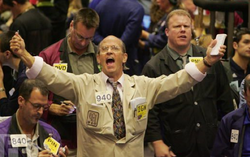The National | 8 February 2011
by Paul Kanitra
Food security is back on the agenda with a bang, but while countries with money but little land want to invest elsewhere, few efforts are as emotive as a global "land grab".
The political risk involved makes such deals fraught with difficulty. There is now considerable discussion concerning how to define stricter investment codes to curb possible abuses.
It is increasingly clear that overseas agrarian acquisitions are problematic. Usamah al Kurdi, the chairman of the founding committee for the Saudi agricultural investment company Agroinvest, says: "Everyone is getting philosophical about this issue."
Some investors, including Hassad Food, which is owned by Qatar's sovereign wealth fund, have reassessed external land purchases. Nasser Mohamed al Hajr, the chairman of Hassad Food, says: "In many cases these deals are not win-win situations."
Food security mandates require a broad-based policy agenda but still must include an offshore farmland investment component.
Strategies with insufficient allocations to property ownership, long-term lease agreements or comparable exposures lack sustainability. Investments that offer long-term solutions contribute best to true food security.
Short-term initiatives have a place but furnish only stopgap solutions. A strategic food reserve is essential but affords only fleeting protection. These efforts are no more consequential to long-term food security than the Strategic Petroleum Reserve is to long-term US energy security.
One is an emergency fuel reserve, the other an emergency grain reserve. The purpose of both programmes is limited to the mitigation of temporary supply disruptions.
Conventional thinking cannot adequately address the complexities of the contentious land-grab issues. Foreign land investments are controversial and need to be approached with considerations to all involved.
Ethically conceived endeavours, grounded in economic sensibilities that interact with food security interests, need to be more thoroughly vetted.
Alternative strategies that offer indirect or economically equal exposure to farmland can provide security assurances.
Much more deliberation should be given to agricultural "impact investments" that can deliver such comforts. These pivotal investments can create a positive impact within the agricultural sphere. They render the potential of long-term sustainable solutions and a higher degree of farmland self-security.
Gulf states need to think outside the box to solve the farmland investment riddle. Surging world demand for farmland, with inelastic supply, is heightening land-grab anxieties. Development of a farmland futures contract could partially resolve this predicament.
A futures contract that could act as a legitimate alternative for physical farmland would open up what is now an illiquid asset class.
The instruments would democratise select farmland for investors, hedgers and speculators to trade in this valuable resource. Tradable futures would unlock opportunities similar to those that contracts now allow for other commodity markets.
Most investments can be bucketed into one of four asset classes; equity, debt, commodity and property. Only the property sector lacks a futures contract, despite past attempts to introduce commercial and residential instruments.
A contract on farmland would bring property's most strategic component to the exchange floor. The term "peak soil" would soon become as common as "peak oil".
A misconception of uniqueness and a perceived lack of defining homogeneous elements have limited considerations of a farmland contract.
But sufficient attributes do exist for the creation of standardised futures on select farmland. Exchange-traded instruments can be written to balance the needs and concerns of all interested parties.
Contracts on US farmland should target four marketplace necessities: providing a viable futures contract for hedging purposes; constructing a proxy farmland investment that will be used by a growing investor base; designing a contract that protects the small farmer from institutional exploitation; and creating a solution that results in winners on both sides by addressing frictions between investors and farmers.
Requirements needed for the design of homogeneous contracts best exist in the US. Success there would lead to extending the efforts elsewhere. An evolution similar to what took place after the introduction of fixed-income futures in the 1970s could well occur.
The first financial futures traded on US securities exchanges. Contracts broadened in scope domestically and eventually expanded globally.
Financial futures were perhaps the most innovative concept ever introduced to the futures industry. Equity futures of the 1980s were of equal significance. Conceptually new futures have been exceedingly rare for decades.
Les Rosenthal, a principal at Rosenthal Collins Group and a former chairman of the Chicago Board of Trade's financial instruments committee, says: "We need an infusion of bright new thoughts … we are getting stodgy."
For the time being, fossil fuels are considered our most essential natural resource. But the long-term picture for demand and value of oil looks suspect. The use of energy alternatives will ultimately drive down what now seems like unabated interest in this commodity. Alternative sources will progressively serve a larger share of the market. From minuscule beginnings, exponential growth will eventually overwhelm the marketplace with alternative sources of energy.
Farmland will prove to be of greater long-term strategic value than oil and gas. The importance of this commodity gains increasing recognition with each passing day. Euromoney magazine went so far in December 2008 as to title an article "Agriculture: Farmland is the New Gold".
A continuation of existing food security efforts is necessary for the foreseeable future. However, new alternative avenues need to be explored. Enterprising food security initiatives will uncover more possible solutions to the current dilemma.
Expanding exclusively into traditional agricultural investments lacks imagination at a time when vision is needed.
Paul Kanitra is an independent consultant focusing on farmland derivatives and alternative food security investments. He is based in the US state of Georgia












